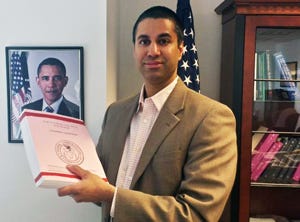Obama Marxists end Internet freedom

FCC Commissioner Ajit Pai Analysis: Now that the Federal Communications Commission (FCC) has passed new rules without legal authority and, thereby, ending Internet freedom, we can read the rules at least before the U.S. Courts address them in multiple lawsuits likely forthcoming. The 400 page Shades of Obamacare document is available online here. In this bazaar bureaucratic government overreach effort to control what we speak, learn, listen, watch and how we fundamentally connect with the world; the FCC betrayed long standing bipartisan support for a free and open Internet. FCC Commissioner Ajit Pai warned those who follow such issues, but main stream media is not so concerned – apparently pesky individual freedoms are not relevant to privileged news sources that so often assert we can “trust” them for all the news that is “fit” for us to know. Can you tell this writer is a little concerned for the country? Maybe if the FCC “Diversity Czar” Mark Lloyd had not heaped praises on Venezuela Communist Dictator Hugo Chavez, as seen below, the public would have more confidence. https://www.youtube.com/watch?feature=player_detailpage&v=IM-iixwmN_A Regardless, Commissioner Ajit Pai, dissented from the majority opinion writing:
Americans love the free and open Internet. We relish our freedom to speak, to post, to rally, to learn, to listen, to watch, and to connect online. The Internet has become a powerful force for freedom, both at home and abroad. So it is sad to witness the FCC’s unprecedented attempt to replace that freedom with government control.
It shouldn’t be this way. For twenty years, there’s been a bipartisan consensus in favor of a free and open Internet. A Republican Congress and a Democratic President enshrined in the Telecommunications Act of 1996 the principle that the Internet should be a “vibrant and competitive free market . . . unfettered by Federal or State regulation.”1 And dating back to the Clinton Administration, every FCC Chairman—Republican and Democrat—has let the Internet grow free from utility-style regulation. The result? The Internet has been an amazing success story, changing our lives and the world in ways that would have been unimaginable when the 1996 Act was passed.
But today, the FCC abandons those policies. It reclassifies broadband Internet access service as a Title II telecommunications service. It seizes unilateral authority to regulate Internet conduct, to direct where Internet service providers put their investments, and to determine what service plans will be available to the American public. This is not only a radical departure from the bipartisan, market-oriented policies that have served us so well for the last two decades. It is also an about-face from the proposals the FCC made just last May.
So why is the FCC changing course? Why is the FCC turning its back on Internet freedom? Is it because we now have evidence that the Internet is not open? No. Is it because we have discovered some problem with our prior interpretation of the law? No. We are flip-flopping for one reason and one reason alone. President Obama told us to do so.
On November 10, President Obama asked the FCC to implement his plan for regulating the Internet, one that favors government regulation over marketplace competition.2 As has been widely reported in the press, the FCC has been scrambling ever since to figure out a way to do just that.
The courts will ultimately decide this Order’s fate. And I doubt they will countenance this unlawful power grab. Litigants are already lawyering up to seek judicial review of these new rules.
Given the Order’s many glaring legal flaws, they will have plenty of fodder. But if this Order manages to survive judicial review, these will be the consequences: higher broadband prices, slower speeds, less broadband deployment, less innovation, and fewer options for American consumers. To paraphrase Ronald Reagan, President Obama’s plan to regulate the Internet isn’t the solution to a problem. His plan is the problem.
In short, because this Order imposes intrusive government regulations that won’t work to solve a problem that doesn’t exist using legal authority the FCC doesn’t have, I dissent.
The FCC document is available here. CNET.com wrote on topic here. The Hill covered the story here.



